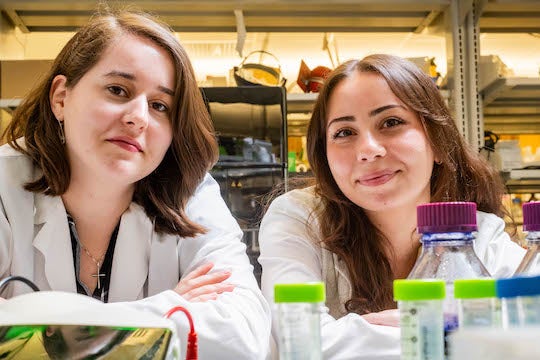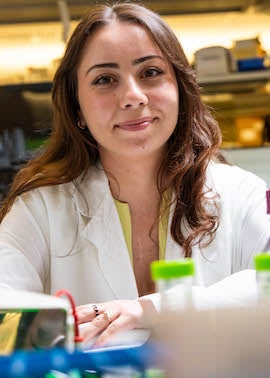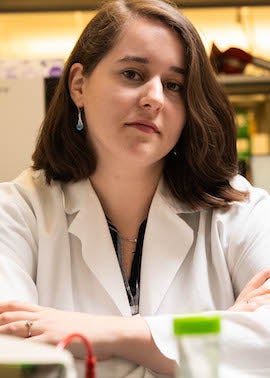We reach more than 65,000 registered users in Dec!! Register Now
Protective particles allow engineered probiotics to report gut disease
- November 13, 2024
- 13 Views
- 0 Likes
- 0 Comment
Platform could enable minimally invasive disease monitoring, smart therapeutics
Trust your gut? Your doctor likely will, too. Probiotics engineered to sense and report signs of bowel inflammation could deliver firsthand knowledge of your system’s inner workings ⎯ provided they are not killed or dispersed in the process.
“For our proof-of-concept study, we chose inflammatory bowel disease, an autoimmune disorder that causes painful and recurrent inflammation flares,” said Elena Musteata, a graduate student in systems, synthetic and physical biology in the Tabor lab. “But gut health plays many important roles in the human body, affecting metabolism, immunity, brain function and other systems. As we discover more biomarkers for different diseases, we can use this platform to diagnose and monitor a lot of different health conditions.”
The platform could help replace what is often a prolonged and complex diagnostic process for IBD ⎯ which involves invasive, time-consuming procedures like colonoscopies and biopsies and relies, in part, on subjective self-monitoring ⎯ with a much simpler and faster procedure.
According to Musteata, a quicker diagnosis could lead to better patient outcomes: “Especially with IBD, it’s very important to minimize the delay between symptom onset and treatment,” she said. “Having a way to assess gut health within a short amount of time and then take action could really generate a significant advance in the clinical management of chronic inflammation and other gut-related disorders.”
Another reason the platform may lead to improved patient outcomes is the ability to tailor treatments to individual patients’ physiology.
“If, in the future, we encapsulate a diverse range of biosensor strains, we could get an idea about a specific person’s inflammatory profile and then use that information to develop a more personalized diagnosis and treatment,” Aghlara-Fotovat said.While it’s not new for bacteria to be genetically programmed to detect disease biomarkers in the GI tract, once inside the body, they face challenges surviving harsh conditions like low pH, destructive enzymes and bile salts. Moreover, free bacteria can disperse widely in the gut, making analysis more difficult and potentially less accurate.
The engineered strain produces a fluorescent green protein in response to thiosulfate ⎯ a compound associated with gut inflammation ⎯ making it possible to assess colon inflammation by measuring bacterial fluorescence after passage through the animal GI tract.
“We found that encapsulation offers several advantages for intestinal biosensing with engineered bacteria,” Musteata said. “First, because capsules are macroscopic, they can be more easily identified and analyzed than free bacteria. Additionally, because bacteria are spatially concentrated within the capsules, their reporter gene expression is easier to visualize than in the same number of free bacteria. Finally, encapsulation can protect bacteria from environmental hazards. For example, we were able to improve the survival of probiotic E. coli under acidic conditions.”
While developing and optimizing the platform was a challenging process, the researchers stressed the necessity of ensuring its reproducibility as a prerequisite for eventual clinical use.“As we worked on developing our platform, we encapsulated bacteria countless times, optimizing each step of the process along the way. There were so many aspects that needed to be characterized well in order to make a clinically translatable product,” Aghlara-Fotovat said.
Musteata said she values the experience of working “not only to design biosensor bacteria as potential diagnostics, but also to collaborate so closely on interdisciplinary projects that seek to translate these systems into medical applications.”
“Even 10 years ago, this idea of engineered probiotics acting as small diagnostic robots that could travel inside your body and detect your disease state was largely in the realm of science fiction. However, groups at Rice and numerous other institutions are now making real progress toward deploying this kind of technology,” Musteata said.
Tabor is a professor of bioengineering and biosciences. Veiseh is a Rice associate professor of bioengineering and Cancer Prevention and Research Institute of Texas scholar.The research was supported by the National Science Foundation (15533317, 1842494) and the National Institutes of Health (R01AI155586, 1RO1DK120459-01) and a Rice University seed grant.
List of Referenes
- Samira Aghlara-Fotovat, Elena Musteata, Michael D. Doerfert, Moshe Baruch, Maya Levitan, Jeffrey J. Tabor, Omid Veiseh. Hydrogel-encapsulation to enhance bacterial diagnosis of colon inflammation. Biomaterials, 2023; 301: 122246 DOI: 10.1016/j.biomaterials.2023.122246
Cite This Article as
No tags found for this post










